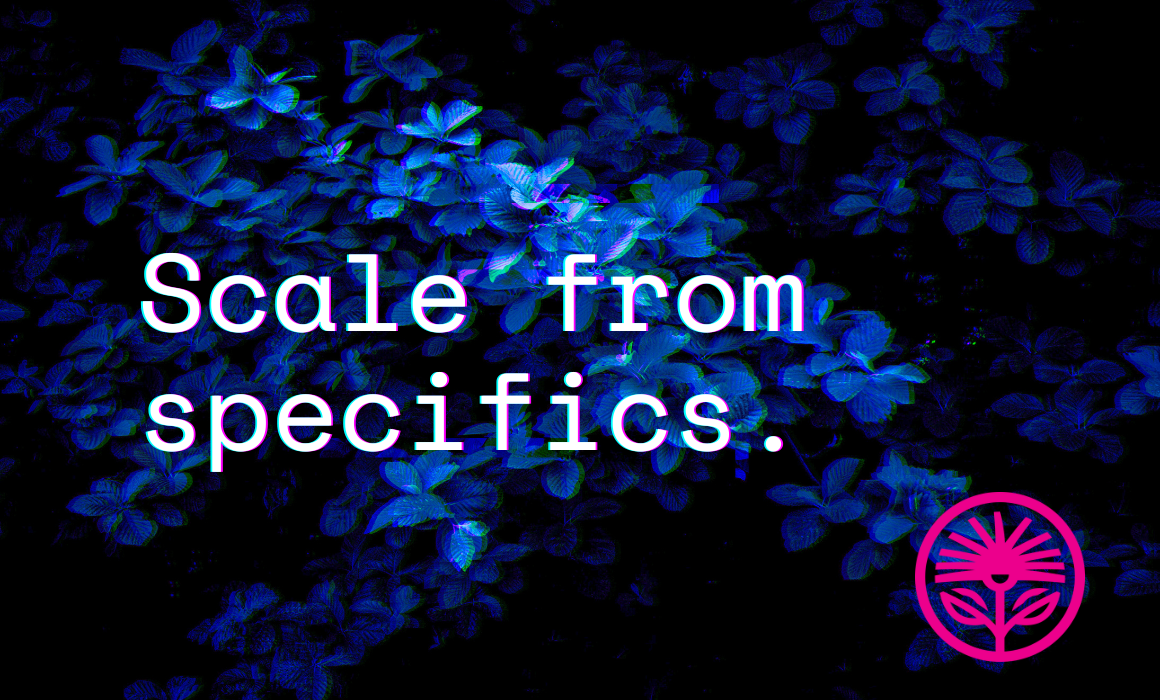Scale from specifics — Kelford Labs Weekly
Focus first, then grow.

“This is the law of focus. You ‘burn’ your way into the mind by narrowing the focus to a single word or concept. It’s the ultimate marketing sacrifice.”
— Ries and Trout, The 22 Immutable Laws of Marketing
The most counterintuitive advice I often give is that, if you want to grow, you need to focus.
Our instincts disagree—surely, if we want to grow, we need to go big and broad?
But I think part of the problem is that, yes, eventually big brands got big.
Eventually, the businesses we admire and notice have ended up expanding their offering and product lines to meet more of their total addressable market.
What gets missed, though, is that this is, like, step 10 out of 10. And it has its own set of tradeoffs and dynamics that are not relevant to the vast majority of businesses.
What we need to look at is not “what do big brands do?” but “how did they get so big?”
And the answer to that, usually, is focus.
Because our customers and clients most of all want certainty that they’re going to get what they pay for. That they’re not going to waste their money or time on someone or something that can’t solve their problem.
Big brands exude confidence because the buyer assumes “they must be good—they’re the biggest name!”
So unless we’re the very biggest, most famous name in the market—or unless we have the resources to pay to become that famous through advertising—we’ve got to establish credibility before we can expand it.
That starts by being known for doing one thing in particular better than anyone else.
And the laws of physics require us to make tradeoffs to get there. It’s simply impossible to be good at everything, all the time. So if we want to be the best—and we do—we have to choose.
“If there was one universal piece of advice I had for marketers seeking to broadly improve their organic search rankings and traffic, it would be: ‘Build a notable, popular, well-recognized brand in your space, outside of Google search.’”
— Rand Fishkin, SparkToro
There once was a time where you could shove some content online with enough keywords and count on clicks. But, alas, tis no longer so.
Now, it’s not enough to have people looking for the sort of thing you do. They need to be looking for you in particular.
Either you by name or brand, or by the very, very specific thing that only you provide.
In either case, it requires us to be singularly focused so that we grow a reputation for doing that thing in particular.
Again, I just want to note, if you have unlimited resources, you can skip this step by investing massively in advertising, far beyond what you’ll see in returns in the near future. But if you take this path, you can never stop.
“Decide what to be bad at. You can’t do it all. In order to be great at something, accept that you’ll be terrible at something else. Refusing to make that choice leads to mediocrity.”
— Dorie Clark, The Long Game
Ultimately, it’s less about choosing what to be good at and more about choosing what to be bad at.
This is the most violated rule of focus. Brands get famous because they don’t do something and then, lo and behold, there they are doing it. Apple made a whole commercial about why it didn’t make big phones and now that’s all they make—and they killed off the mini line after two generations.
But you get big enough to violate this rule by first obeying it. If you try to grow your product line before you’ve hit an efficient scale, you’ll spread yourself too thin. If you try to hire in a bid to scale your volume before you have the demand, you’ll run out of resources before you get a return.
“Make sure that what you promise is important to your customer.”
— David Ogilvy
So how do you decide? You find out what’s actually important to your ideal customers, and what they don’t actually care about.
That means being endlessly curious about how they experience your value, and how they describe it to others. Focus on what they focus on, and what they leave out. And compare what they value and promote against what you do.
Then, look for ways to describe your business in those terms, with that level of specificity.
You don’t have to eliminate a product line or service area at this phase, you’re just adjusting what you say to determine if the market agrees.
If you find your sales conversations are smoother, and more successful, with the new language, you have a clue about what to change. Or if sign-ups increase on your website because of a copy adjustment, you know you’re on to something.
“The secret to being found online is referencing your prospect’s specific problem using the exact language they’d use.”
— David A. Fields, The Irresistible Consultant’s Guide to Winning Clients
At the core, scaling a business or growing a brand is about capitalizing on what is already there.
The demand that already exists and the reputation we already have. It’s about getting so specific about what our ideal clients care about that they tell others about the extraordinary experience we provide.
It’s about giving our advertising and promotion the credibility they need to spread beyond what we pay for, so our efforts compound over time instead of diminish.
My office is filled with potted plants. And my favorite thing is knowing that, before they fully invest in growing up and out of their pots, they invest energy downward into their roots.
That allows their growth to explode and expand, leaf by leaf. But only after they have a strong foundation.
Scale, ultimately, is about growth not invention. We already need to be providing extraordinary value to the people who value it most. So that our marketing becomes demonstrating that value at a distance.
And so we don’t have to spend millions just to get noticed. Because people are already looking for us.
We just need to be findable. Which starts by being credible.
Which starts with focus.
Kelford Inc. shows you the way to always knowing what to say. Marketing positions and messages for growing entrepreneurs.



